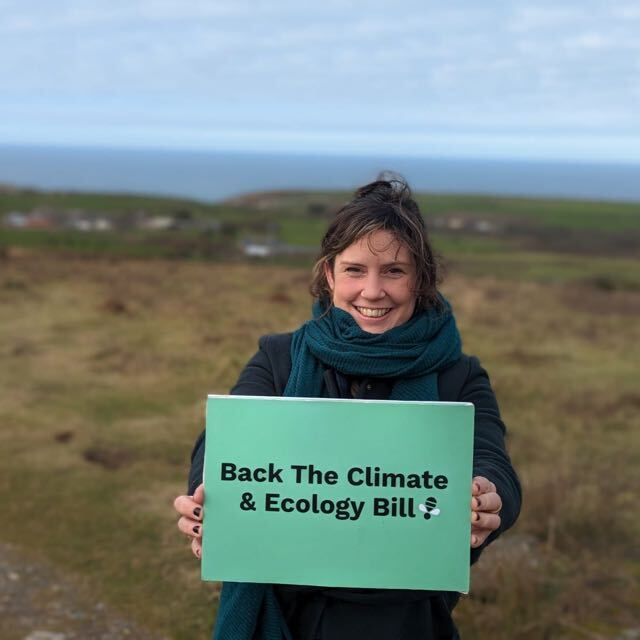Today’s “energy security day” announcements make Zero Hour’s work harder—but we will not stop. The CAN Bill is needed now, more than ever.
Commenting on the UK Government’s “energy security day” announcements, Dr Amy McDonnell (Zero Hour director) said:
“The British people can’t wait for the next Westminster election for a government that will take the climate-nature crisis seriously; delivering a joined-up plan that will rapidly reduce emissions in line with 1.5°C, and ensure nature loss is put into reverse.
Despite Ministers’ pledges at (UNFCCC) COP27 and (UNCBD) COP15 that they will “keep 1.5°C alive” and reverse nature’s destruction by 2030; these two, essential pillars of a serious environmental strategy are still missing from the Government’s plans.
Today was an opportunity to align the UK’s climate and biodiversity strategies with the best available science. It was a chance to get back on track. To match rhetoric with action. And to lead the world by transitioning to a sustainable society, powered by renewables.
Zero Hour is fighting for a liveable future, via the potential of new, bold, science-led legislation, the Climate & Nature Bill. Today’s announcements make this work even harder. But we will not stop our work. It’s needed now, more than ever.”
Below is also comment from CAN Bill supporters, (Labour MP) Olivia Blake and (ZSL’s) Prof. Nathalie Pettorelli.
“With the IPCC’s final warning for 1.5°C, reports that the UK is off track to meet its own net zero targets, and the lack of a joined-up strategy to tackle the climate and nature crises, it’s clear that the UK Government needs an environmental rethink—not a net zero reset. To be truly world-leading, we need to align our climate and nature targets, strategies—and trade deals—with what scientists are telling us, again and again, are the planet’s safe boundaries. In the UK, this means enacting the Climate & Nature Bill.”
Olivia Blake MP (Labour, Sheffield Hallam)
Zero Hour’s immediate response to today’s “energy security day” announcements is that the UK Government, in order to get back on track, should:
(1) Enact the Climate & Nature Bill to set, in law, a serious strategy to tackle the climate-nature crisis in a joined-up way.
► Today’s multiple publications, plus the Net Zero Strategy, and the Environment Improvement Plan aren’t joined-up, and, separately, will not tackle either the climate or the nature crises we’re facing.
► The Government’s “energy security day” was a chance to align the UK’s emissions reductions plans with the strongest chance of meeting Britain’s 1.5°C obligations. Failing to do so is effectively giving up on the UK’s Paris Agreement obligations.
This involves:
(2) Reversing the destruction of nature, including the restoration of crucial carbon sinks, such as wetlands, peatlands and woodlands.
► Following (UNCBD) COP15, the Government celebrated the adoption of the global goal to reverse nature’s destruction by 2030.
► By failing to do so in either its half-baked environmental targets or Environment Improvement Plan, we’re now on course to have less wildlife in 20 years’ time, not more, setting us on a path of managed decline.
In addition, the Government needs to be:
(3) Leading an all-out effort to become a 100% renewable nation, ending our dependence on tyrants’ fossil fuels—keeping UK oil and gas in the ground—while reducing bills, and boosting green jobs, on the way.
► Soaring energy bills, leaky buildings, a reliance on imported fossil fuels—and a lack of investment in homegrown renewable energy, is as baffling as it is backwards.
► We could have a renewable revolution, boosting jobs, reducing bills, and tackling pollution, but the Government is failing to unleash the full potential of British solar, tidal and wind.
“The nature and climate change crises are interdependent issues. A rapidly changing climate is threatening the long-term survival of species and the integrity of ecosystems across the globe. The loss of biological diversity is reducing our planet’s ability to store carbon and nature’s, as well as people’s ability to adapt to and cope with more challenging climatic conditions. In addition, both climate change and biodiversity loss underpin the public health crises created by zoonotic disease emergence and spread. Science has connected the dots. Now politicians urgently need to do so too.”
Prof. Nathalie Pettorelli (Institute of Zoology, Zoological Society of London)


